夏 (なつ - natsu - Summer) is the next big season in Japan, where the grey clouds of 梅雨 (つゆ - tsuyu - the rainy season) finally give way to sweltering tropical heat. It's not all sweat and sunburn though - among other things, 夏 plays host to some of the best festivals of the Japanese calendar; balmy nights with special events, games, food and ice-cold drinks.
Grab your fan, it's going to be a hot one.
Let's get the bad stuff out of the way first. It's not hard to miss the start of 夏 - during the day the temperature suddenly shoots skyward which also means the start of sweaty and restless nights unless you're lucky enough to have an air conditioner. It doesn't get as hot as in Australia in terms of numbers, but the cloying humidity makes 30 degrees feel like 50 at times. "蒸し暑い" (むしあつい - mushiatsui) is a word you'll hear often - "muggy" or "humid". Particularly bad days can see your back soaked within minutes of going outdoors and it's often an exercise in jumping between air conditioned buildings. It's definitely a time of hand-held fans, sweat towels and spare clothes. Should that not clue you in, the 蝉 (せみ - semi - cicadas) also abruptly emerge across the whole of Japan and begin their season-long dirge.
After a while, you may start to wonder how something so small can make so much noise; when enough of them get together, it ends up sounding like a car alarm. You may notice holes in the ground where they've burrowed up as well as their moulted shells still clinging to trees by the dozen. I walked past a bus stop in 京都 (きょうと - Kyoto) at one stage to see a basketball-sized pile of shells, which made me wonder exactly how many are out there. 蝉 would have to be considered the sound of summer, then, and "sticky" would be the feeling - the good news is that the sights are much nicer.
The nights are where 夏 really shines, when celebrations stretch long into the warmer evenings and rooftop restaurants, beer gardens and 夏祭 (なつまつり - natsumatsuri - Summer festivals) officially open their doors. In the latter, stalls, performances and dances are set up at shrines, public spaces and occasionally beaches; I think it's a great way to enjoy 夏休み (なつやすみ - natsuyasumi - Summer holidays) and judging by the crowds, I'm not alone. 浴衣 (ゆかた - yukata - light cotton kimonos) start filling department store shelves and before long you can't walk too far without seeing people wearing them.
Each 浴衣 has a different pattern, which means that most 夏祭 will be awash with colour as the clog-wearing crowd totters between food and game stalls. The girls always look particularly impressive - they all wear 帯 (おび - obi - belts/sashes) tied in one of several intricate ways. I've seen firsthand how difficult these are to tie which is probably why some of them cheat - you can buy perfectly tied clip-on 帯 if you don't have time to perfect your butterfly knot.
It's not just the girls, of course - although not quite as bright and floral, there are also 浴衣 for the boys that can look just as sharp. Their 帯 are usually just softer sashes that tie around their waists, as opposed to the rigid fabric the girls use. For the boys who want to get into the spirit without dressing up so much, there's a more casual form called 甚平 (じんべい - jinbei), consisting of a short sleeved jacket and shorts. This one has no 帯 - it just ties together with straps. This is just the ticket if you need all your limbs free for some serious game playing.
Probably the most popular game at 夏祭 and other celebrations is 金魚すくい (きんぎょすくい - kingyo sukui - goldfish scooping). Players huddle around a trough of water and try to catch 金魚 (きんぎょ - kingyo - goldfish) with a small scoop. The scoop consists of a plastic ring with very fine paper in the middle which rips easily in the water; the key apparently is to move it slowly enough that the paper doesn't rip, which can be difficult when trying to nail down nervous 金魚! Should you win any, they're placed in a plastic bag of water for you to take care of at home. Sometimes the 金魚 are replaced with bouncy balls, toy fish or even turtles.
Not all the action happens at the 夏祭, of course - it's a perfect time to go to the beach on those lazy 夏休み days. Beaches and parks seem to be the place to go for 花火 (はなび - hanabi - fireworks - literally "fire flowers") as well. 花火 are sold freely here during 夏, promptly appearing on the shelves of コンビニ (konbini - convenience stores) in particular. As night falls on the beach, it's a common sight to see people of all ages noisily playing around with sparklers, rockets and Roman candles.
花火 are often sold as value packs in big bags or buckets which give you enough ammunition for a night of pyrotechnic fun. They come in all sizes - tiny explosive firecrackers and biscuit-sized pinwheels right up to huge freestanding launchers that shoot off repeated blasts. They've become so popular that a lot of beaches have strict rules about when 花火 are allowed, to prevent the residents being kept up all night by the squeals of rockets and giggling onlookers. After a while, you may want to move on to something a little bigger anyway.
The official 花火 displays in Japan really are something to be seen - most happen around late July and early August. Thousands of people turn out to see them and having been to the latest, I don't blame them. Enormous blasts of colour filled the space over what was already a very nice view of the city - some were even shaped like love hearts. The display kept getting more and more impressive until it reached a crescendo - a sparkling golden 花火 so big I couldn't even fit it all into the frame. This is how you ring in a new season!
To me, 夏 is a time when Japan has a lot of good excuses to let its hair down a little and relax. Even the notoriously strict dress code for サラリーマン ("salary man" - office workers) is relaxed, giving way to "Cool Biz" (short for "cool business") - short sleeves, no tie. It may be horribly hot, sticky and noisy during the day, but once people start booking in their 夏休み trips, hopping into their 浴衣 and heading out to the 夏祭 festivities long into the night, I don't think anything could be further from their minds.
"We love Summer!", said one of the posters on the train this morning. I think I'm starting to understand why.
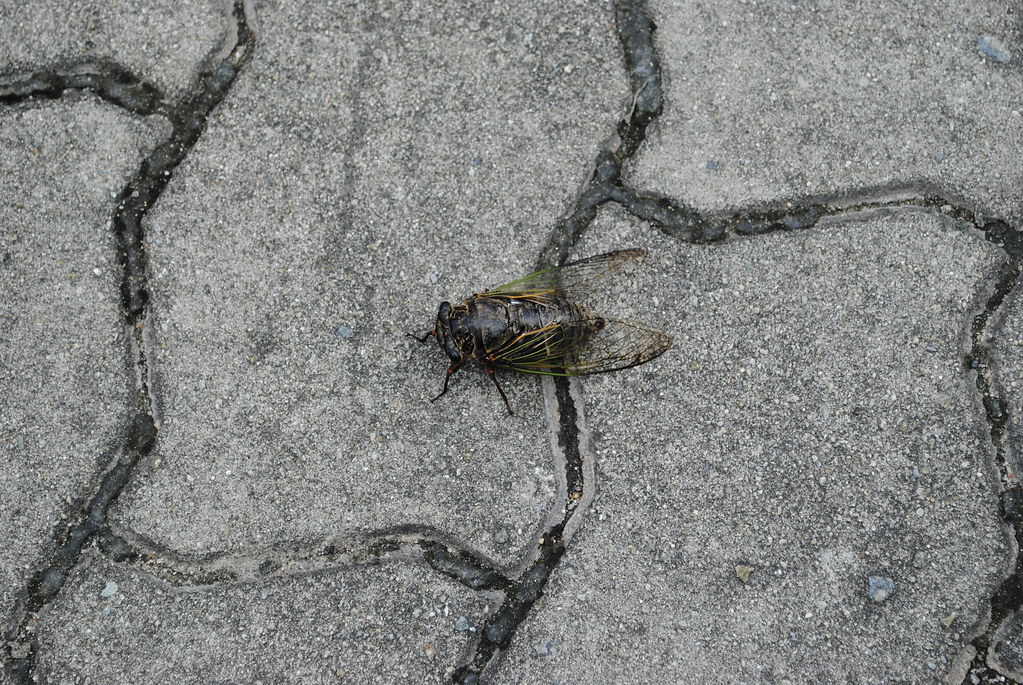
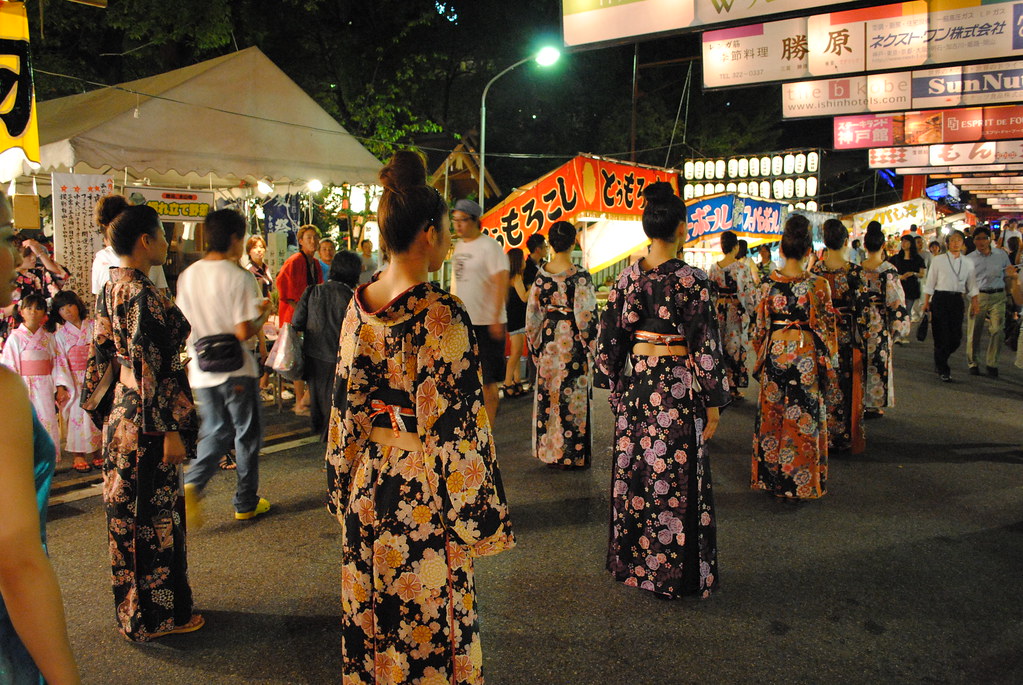
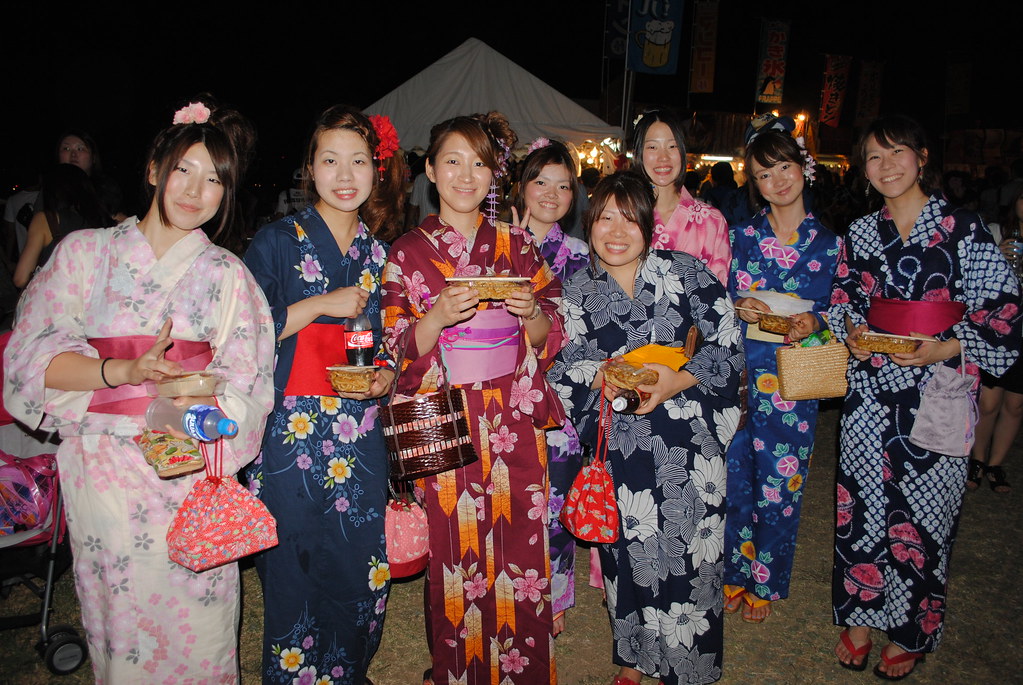
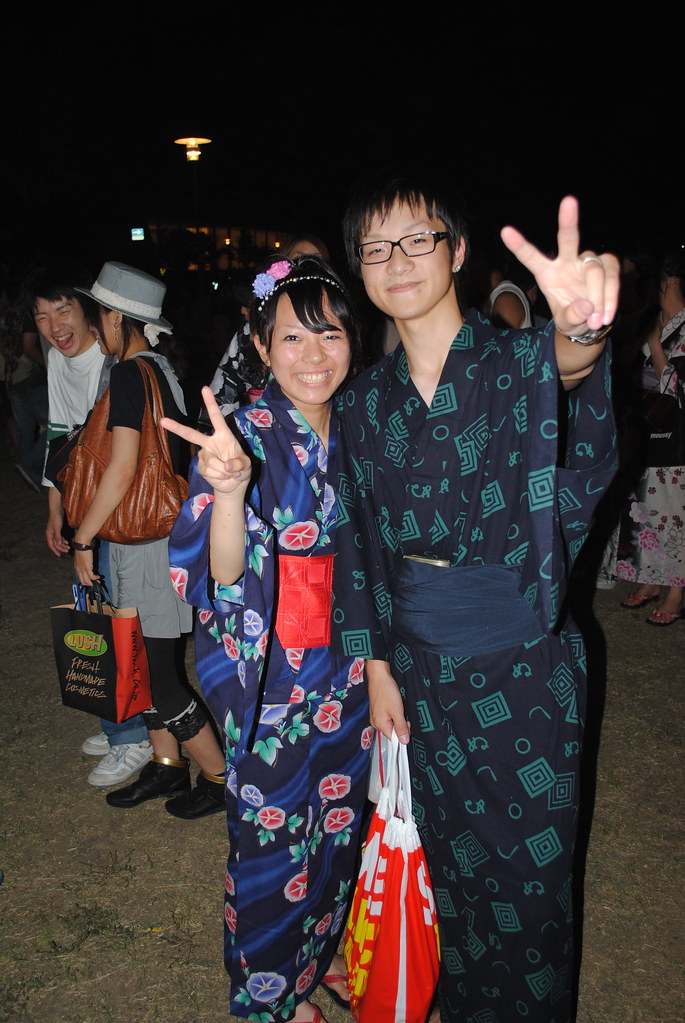
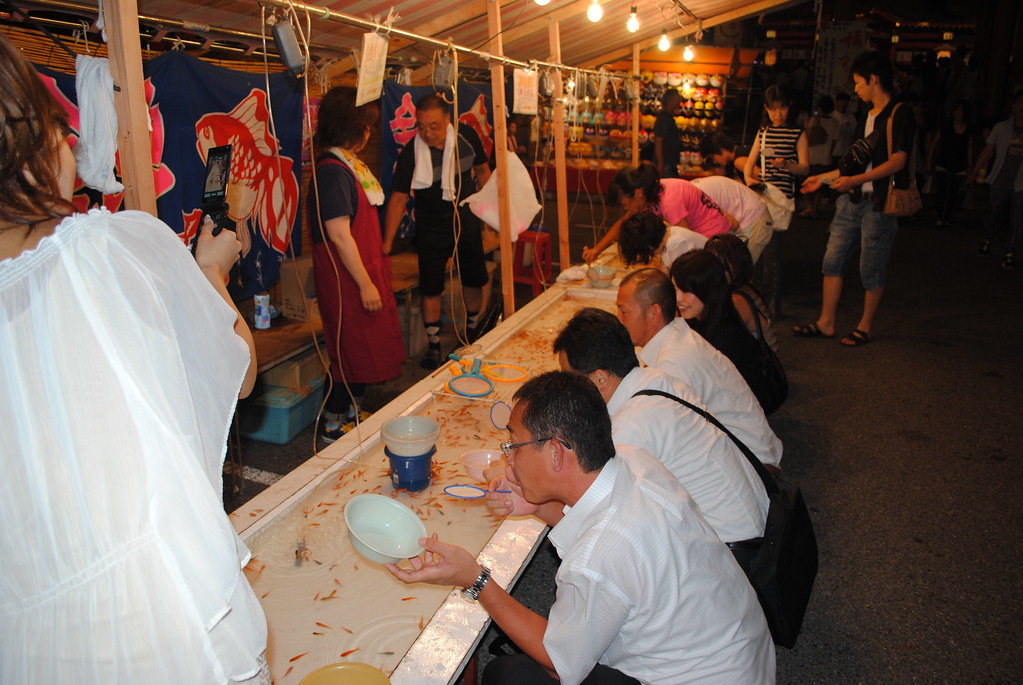
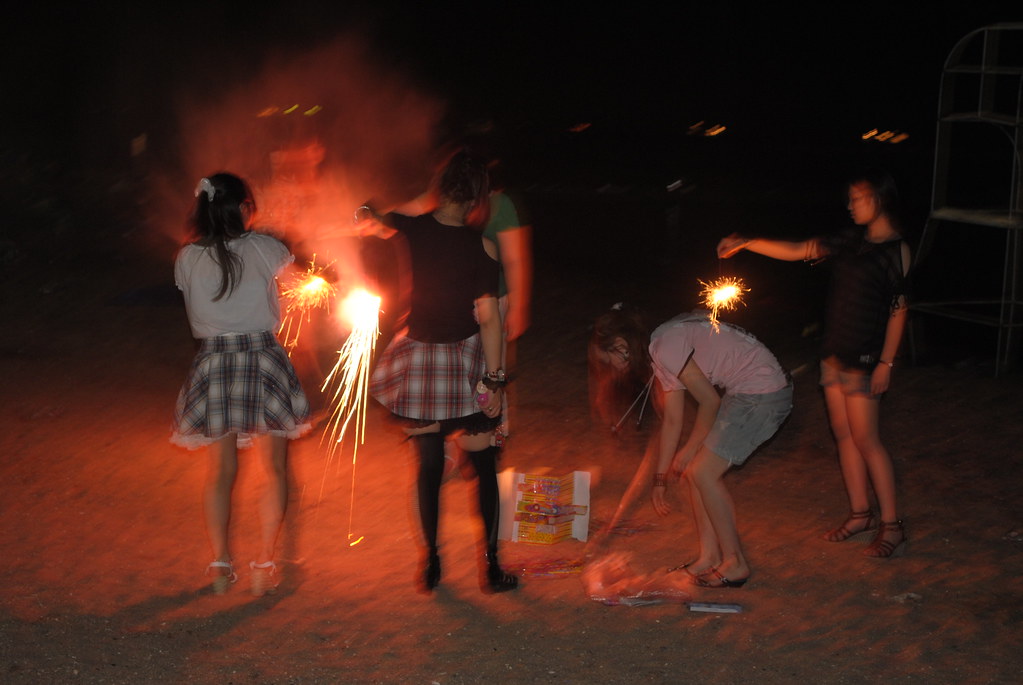
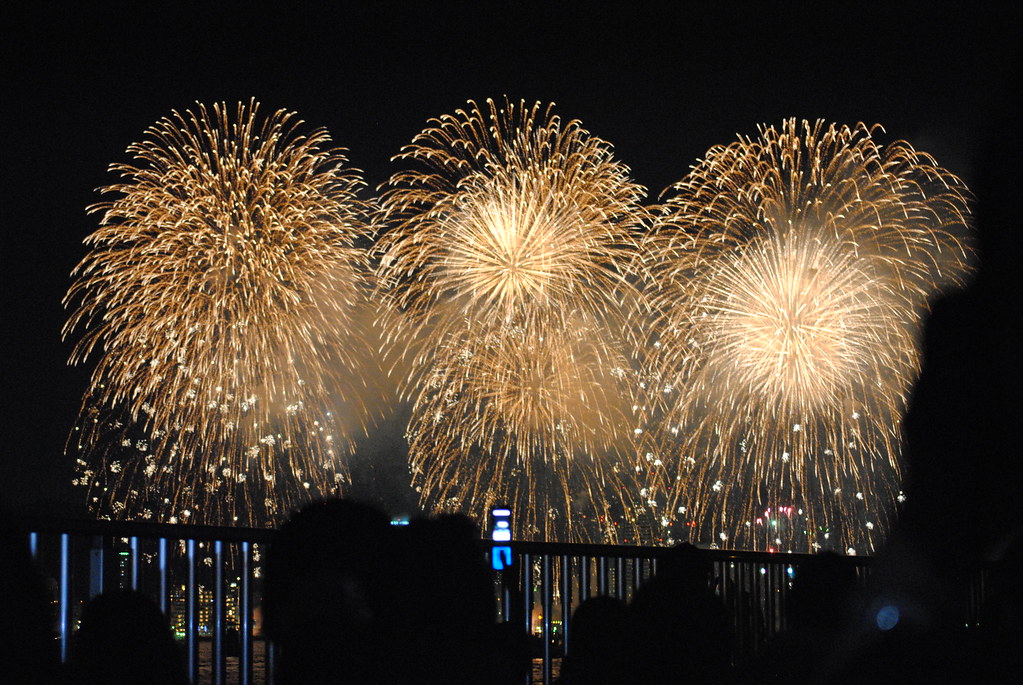
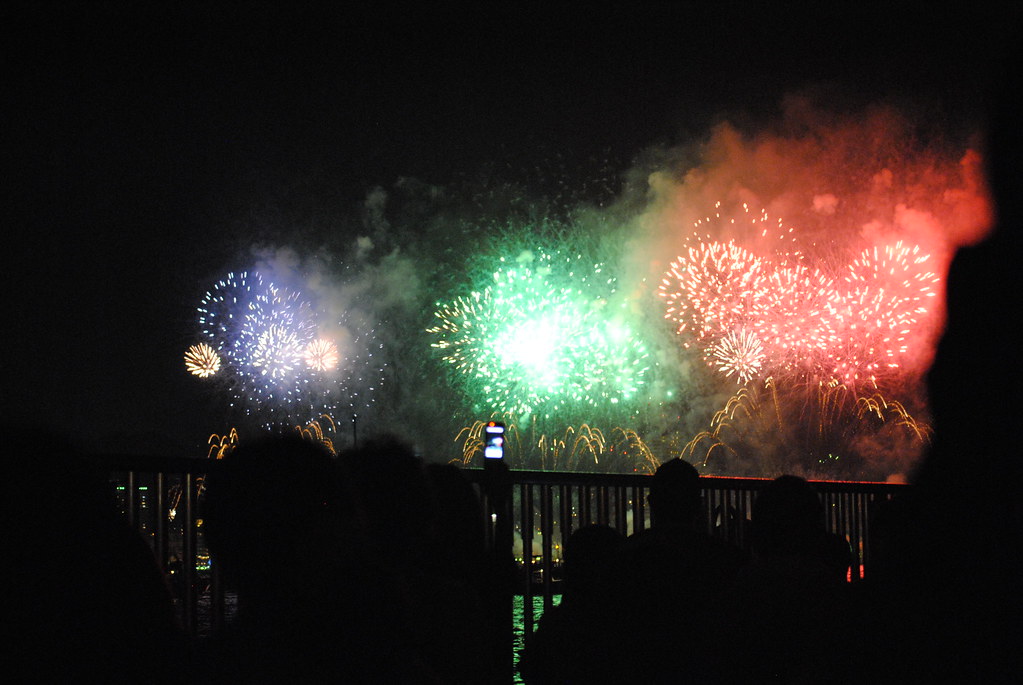

No comments:
Post a Comment
If you have any questions or additions, I would love to hear from you. I may not know the answer, but I'll do my best to find out in any case! You can post anonymously if you like, but abusive/unintelligible/inappropriate comments will not be published.